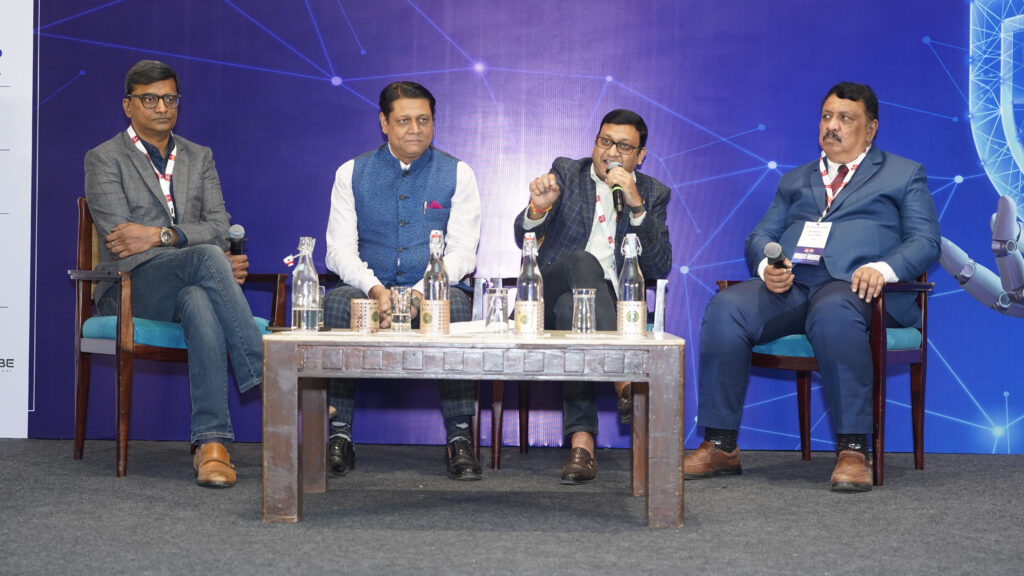
Panelists:
· Ankit Goenka, Head – Customer Service, Bajaj Allianz General Insurance
· Dr. Roy Kshemendra Sharma, Head of Communications & Customer Centricity, Tata AIA Life Insurance
· Upendra Namburi, Founder, Ideaearth Labs
· Dr. Ravi Sheshadri, Strategic Advisor- Insurance and Insurtech (Moderator)
At the InsureNext Global Conclave & Awards 2025, the panel discussion titled ‘The Quest for New Customers’ brought into focus the evolving strategies of insurance companies and InsurTechs as they aim to acquire and retain customers in an increasingly complex and digital landscape. With customers demanding real-time, seamless experiences and regulators requiring strict compliance, the need for balance has never been more critical.
Together, the panelists presented a blueprint for how the insurance ecosystem can embrace digital transformation without losing sight of empathy and responsible innovation.
An Emotional Contract
Ankit Goenka initiated the conversation by drawing attention to a fundamental truth often overlooked in the insurance domain: insurance is an emotional contract. He emphasized that general insurance products, especially health and motor insurance, do not deliver tangible benefits at the time of purchase. Customers pay premiums expecting protection when something goes wrong. This makes claims the true moment of truth in the insurance journey.
Ankit elaborated on how Bajaj Allianz General Insurance has reimagined the claims experience through its ‘Care Angels’ initiative. These individuals are positioned at partner hospitals and act as touchpoints for customers and their families during hospitalization. Their role is to assist with paperwork, guide through claim formalities, and offer a human connection at a time of vulnerability. “In that critical moment, we are not just settling claims; we are easing a family’s emotional stress,” Ankit explained. The result? Care givers become the insurer’s strongest brand advocates, leading to higher customer retention and future business whether it’s a motor policy renewal or a new health insurance purchase.
Moving Beyond Transactions
Dr. Roy Kshemendra Sharma expanded on the need for insurers to move beyond transactional relationships. Historically, the focus in life insurance was on selling products and achieving sales targets. However, the industry is now evolving towards lifecycle-centric engagement, where insurers establish long-term relationships with customers based on their evolving needs.
Sharma emphasized that AI and analytics now enable insurers to map customer lifecycles more effectively. “From the birth of a child, education milestones, marriage, to retirement planning there are critical life events where insurance can play a meaningful role,” he said. AI allows insurers to proactively design offerings that are timely and relevant. Rather than casting a wide net, Sharma recommended focusing on the top 1% of customers who have high potential for cross-selling and deeper engagement, ultimately maximizing the customer’s lifetime value to the insurer.
Instant Gratification vs. Regulatory Compliance
Upendra Namburi brought attention to the growing gap between customer expectations and regulatory frameworks. Modern customers, accustomed to the seamless experiences offered by platforms like Amazon and Swiggy, expect instant gratification across all service touchpoints, including insurance. However, insurers operate in a highly regulated environment that prioritizes compliance and data privacy.
Upendra stressed the importance of engaging regulators in open dialogue. “When we sit across the table with regulators and explain our challenges transparently, they listen,” he said. Building trust with regulators ensures that AI-driven innovations comply with regulations without compromising speed or customer experience. He warned against rushing to implement AI across departments without a cohesive strategy, as fragmented approaches can create compliance risks and customer confusion.
The Foundation for Transformation
Upendra reinforced a critical point, AI follows data. While organizations are eager to deploy AI and ML for customer acquisition and engagement, success depends on clean, structured, and consent-driven data management practices. He urged insurers to establish a centralized data strategy, ensuring consistency, security, and customer consent across the enterprise.
Dr. Sharma added that data is inherently neutral. “It’s how we use data that determines whether we are aiding or troubling the customer,” he explained. Ethical data usage, backed by robust governance, will differentiate responsible insurers from those that merely chase short-term efficiency gains.
A Practical Approach
Ankit shared Bajaj Allianz’s journey of migrating legacy data to the cloud, a task that involved processing decades of unstructured records. Successful data migration, Ankit noted, hinges on defining clear objectives. “We asked ourselves, what customer journeys are we trying to enhance? Which data fields are essential to that journey?” he explained. By focusing on the data sets that directly impact customer experience and regulatory compliance, Bajaj Allianz was able to streamline its migration and maximize the value of its data.
He drew parallels from the airline industry, where personalized service based on customer data builds loyalty. For insurers, the same principle applies. “If you know how to use data to deliver better service, that data becomes invaluable,” Ankit said.
A Dual Opportunity
Upendra highlighted a largely untapped growth area for insurers: SMEs. He pointed out that SMEs represent a dual opportunity, insurers can provide coverage not only for the business but also for the individual proprietor and their employees.
By leveraging data points like GST filings, spatial analysis, and industry-specific risk factors, insurers can design tailored products such as fire, liability, and employee health insurance for SMEs. “This isn’t about selling a standard product. It’s about understanding the unique needs of an SME and offering a comprehensive risk solution,” Upendra explained. He also encouraged insurers to empower their field teams with actionable insights so they can target high-potential micro-markets more effectively.
Responsible AI and Real-Time Relevance
As the panel discussion concluded, the focus shifted to the responsibility that comes with AI adoption. Ravi Sheshadri remarked on the ongoing global debate around responsible AI, particularly regarding privacy, consent, and ethical data usage.
Dr. Sharma summarized the sentiment succinctly: “There’s no good or bad data. There’s only responsible or irresponsible use.” As AI becomes more pervasive, insurers must prioritize transparency, accountability, and ethical decision-making. Those that do will not only meet regulatory requirements but also foster deeper trust with customers.
The key takeaway from the discussion at InsureNext Global Conclave & Awards 2025 was clear: technology and AI are indispensable tools in modern insurance, but they are not replacements for human empathy and ethical leadership. Insurers and InsurTechs that blend technology with human understanding, align with regulatory frameworks, and maintain a customer-first mindset will shape the next era of customer acquisition.







